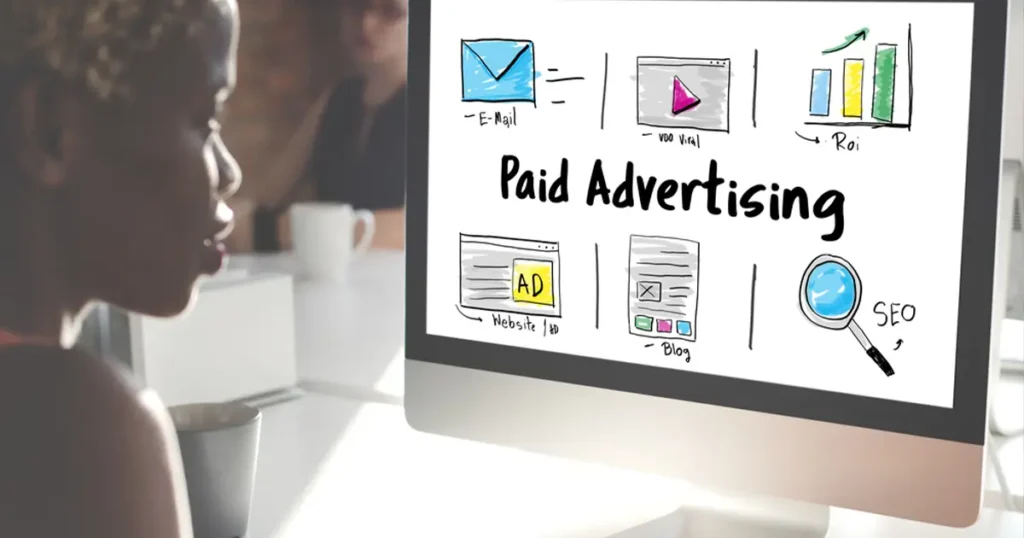Are you ready to modify your online presence and speed up the growth of your business with PPC marketing?
If yes, we got you covered!
But what is PPC marketing?
PPC (Pay-per-click) advertising is a kind of online marketing where advertisers are charged a fee each time one of their ads is clicked. Simply put, you only have to pay for advertising if someone clicks on your ads. It involves ‘buying’ website visitors in addition to generating them naturally.
Moreover, PPC marketing, which prioritizes your advertisements in search engine results and on various online platforms, only charges you when a user intentionally performs an action, like clicking on your ad.
Additionally, understanding and utilizing the potential of PPC marketing has grown to be more than a benefit for companies looking to increase their ROI and attract their target market.
So, let’s explore the fascinating world of PPC marketing, learning about its types, advantages, and the strategic brilliance it provides to the current business world.

Types of Paid Advertising
Paid advertising comes in various types, each with benefits and relevance for specific platforms and objectives.
Some of the most common kinds are listed below:
- Search Engine Marketing (SEM)
This involves creating advertisements for visibility on search engine results pages (SERPs), usually at the top or bottom of the page. Advertisers make bids on keywords that are related to their products or services.
Further, the advertisements appear on Pay per click sites when a user searches using those terms. The most well-known platform for search engine advertising is Google Ads (formerly Google AdWords).
- Display Advertising
Banner Ads: These Ads are visual advertisements that frequently appear at the top, sides, or within website content. Images, text, and occasionally interactive features are possible additions.
Demographics, interests, and browsing behaviours can all target display advertisements.
Video Ads: Short video clips displayed before, during, or after online video content. Advertisers can show their video ads to a targeted audience on websites like YouTube.
Native Ads: Seamlessly integrating with the website or platform’s content makes these adverts less intrusive and more interesting for users.
- Social Media Advertising
Facebook Ads: Advertisers can build Facebook advertising specifically targeted to the demographics, interests, and behaviours of Facebook users. Ads can be displayed on Instagram in users’ feeds, on the right sidebar, in stories, and elsewhere.
Twitter Ads: These Ads can be targeted based on keywords, interests, and demographics and appear in user feeds.
Instagram adverts: These are presented to users in their Instagram feed or Stories and can be photo or video ads.
LinkedIn Ads: LinkedIn offers targeted advertising based on job titles, industries, and professional demographics.
- Shopping Advertising
Google Shopping Ads: When people search for specific products, these appear at the top of Google’s search results and provide product photos, pricing, and shop information.
Amazon Sponsored items: In order to make their articles more visible, Amazon sellers can promote them on product detail pages and search results pages.
- Retargeting/Remarketing
This tactic focuses on people who have visited your website before but have not converted. These customers see advertisements on other websites, encouraging them to return and finish their actions.
- App Advertising
Advertisers can promote their mobile apps on various platforms, including pay-per-click Google, social media channels, and Apple Search Ads.
- Affiliate Advertising
Advertisers use affiliate marketing to drive website traffic and purchases by paying affiliates (often bloggers, content producers, or website owners) a commission.

Benefits of PPC Marketing
PPC marketing has many benefits for companies looking to succeed in the digital world.
PPC advertising agencies enhance these benefits by creating and running campaigns that attract targeted traffic, maximize ROI, and correspond with business goals.
Let’s explore the benefits of PPC marketing:
- Targeted Reach
PPC enables companies to customize their advertisements to particular demographics, locations, devices, and even times of the day. The chances of conversions increase because of the precise targeting, ensuring that the right audience sees the advertisements.
- Immediate Results
PPC campaigns could start driving in visitors and producing leads as soon as the advertisements are displayed, unlike organic techniques like SEO, which take time to show results. For time-sensitive marketing or new product launches, this quickness is very helpful.
- Measurable And Trackable
PPC offers an in-depth analysis of the performance of ads, enabling companies to monitor metrics such as clicks, impressions, and conversions. This information helps assess the success of campaigns and make the required modifications to improve results.
- Flexibility And Customization
PPC campaigns could be flexible and tailored to specific goals, such as boosting website traffic, generating leads, or driving sales. Advertisers can experiment with various ad formats, keywords, and targeting options to discover the right combination for their goals.
- Brand Exposure
Users still see your company name and message even if they don’t click on your advertising. Although there are no immediate sales, this exposure can help build brand awareness and customer trust.
- Rapid Entry to Market
PPC offers a rapid way for companies to enter a new market or launch a new product to gain awareness and test the waters without the time commitment needed for organic strategies.
- Cost-effective
PPC is a pay-per-click business model, so companies only pay when customers click on their advertisements. This cost-effectiveness is very beneficial because you pay for genuine content engagement.
Let’s Convert Clicks Into Sales With PPC Marketing!
Are you ready to enhance your online presence, attract specific audiences, and witness exceptional company growth?
Look no further than ByteTeck Consulting, your reliable partner for top-notch PPC marketing.
Don’t miss the great opportunities that PPC marketing can provide your company.
ByteTeck Consulting offers the expertise that will bring you to the front of the digital realm, regardless of whether you’re just starting or wanting to improve your current strategy.
Contact us to begin your PPC journey with ByteTeck!
Takeaway
The answer to the question “What is PPC marketing?” in digital advertising could be found in an innovative tactic that has transformed how companies interact with their audiences.
Businesses can boost their online exposure using PPC, communicate with their target audience effectively, and build brand awareness in a crowded online marketplace.
Further, PPC’s data-driven methodology allows advertisers to make wise decisions, optimize campaigns, and increase return on investment.
Therefore, embrace PPC marketing today to enter a world where your brand’s story grows in accordance with the needs of your target market.
PPC, known as Pay-Per-Click, is a form of online advertising in which advertisers are charged a fee each time an ad is clicked.
Internet marketers that use PPC, or pay-per-click, are charged a fee each time one of their advertisements is clicked. In simple words, you only pay for advertising when a user clicks on your ad.
PPC Google Ads is a type of online advertising where marketers can create advertisements and bid on keywords. They are paid when people click on the advertisements they display in the Google search results and on other websites.
In the PPC model of online advertising, marketers compete to have their adverts appear on websites or in search engine results. Advertisers are charged a fee when customers click the ads, which increases traffic to the advertiser’s website.
PPC is indeed a marketing strategy that includes running online advertisements and paying when customers click on them to visit the advertiser’s website.
The business goals, target market, and budget are just a few factors determining whether PPC is a successful marketing approach. Fast-focused traffic generation could be possible with it, but long-term costs may be high.
Pros: PPC benefits include quick results, correct targeting, and measurable ROI.
Cons: Expensive, needs continual supervision, and might lead to click fraud.
Digital marketing’s “4 C’s” of PPC are Cost, Clicks, Conversions, and Campaigns. These indicators help in determining how effective PPC campaigns are.
Compared to SEO, PPC may provide faster results and more control over ad placement. But it’s not always “better” than SEO; both approaches have advantages and are frequently used together.




